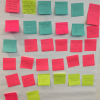Presenters and slide deck
Nicole Obeid - Lead, Research and Outcomes Management, Children’s Hospital of Eatern Ontario
Hilary Allen - Mental Health Advocate
Key Learnings
- There is a need for early intervention services for young people struggling with Eating Disorder related concerns (body dissatisfaction, disordered eating, subclinical eating disorders). Emerging evidence illustrates that treatment of individuals struggling with non-chronic Eating Disorders result in better outcomes than those who are chronic. In addition, the onset of Eating Disorder related struggles is well known to be during adolescence and young adulthood, thus justifying the need for early interventions for young people.
- There is a conceptual Early Intervention Eating Disorder Model for Integrated Youth Services being co-developed with youth, families, clinicians, researchers, and policy makers. The development of this model began with a literature review and environmental scan of Integrated Youth Services globally, where it was identified that existing hubs would like support in 1) training, 2) screening, 3) treatment, 4) system navigation, and 5) developing safe settings and environments for youth with Eating Disorder struggles.
- This conceptual model aims to optimize and compliment current system transformation efforts and maintain a focus towards partnerships and sustainability. Specifically, it aims to support the identification of relevant training and screening resources, and presents a suite of interventions specific to Eating Disorder struggles that can operate within a stepped care framework.
Identified Gaps in Research, Practice, and/or Policy
There is a gap in the health system’s ability to serve those with eating related struggles at the early intervention level that is available in the community. Further research and collaborative practice-based testing of early intervention models is required to ensure adequate community-based services are available to youth to address these prevalent concerns.
Contact Email of Presenter
Nicole Obeid: nobeid@cheo.on.ca
Hilary Allen - hilaryallenottawa@gmail.com
